As a content creator, the moment your social media posts start generating income—whether through brand deals, affiliate links, or even free products—you’ve officially entered the business world in the eyes of the IRS. And with that shift comes tax obligations that can feel overwhelming if you’re unprepared.
Understanding taxes isn’t just about avoiding penalties. You must strategically protect your earnings and set your creator business up for long-term growth. The right approach can help you legitimately reduce your tax burden while remaining fully compliant.
To break it all down, we spoke with Nicole Green, a senior tax consultant at Robert Hall & Associates, and Caitlyn Kumi, a personal finance creator and impact.com board advisor during our Financial Fit Check webinar.
From influencer tax write-offs to business structures that could save you thousands, here’s what every creator needs to know to set themselves up for long-term financial success.
Disclaimer: This content has been prepared for informational and entertainment purposes only, and is not intended to provide, and should not be relied on for, tax, legal, or accounting advice. You should consult your own tax, legal, and accounting advisors before engaging in any transaction.
Table of contents:
- Influencer must pay taxes on their income
- The easiest way for influencers to track income and expenses
- How to determine what qualifies as an influencer tax write-off
- 4 ways influencers can maximize their tax savings
- Set your business up for long-term success
Influencers must pay taxes on their income
The IRS considers all revenue generated by sponsorships, ads, affiliate marketing, and similar activities taxable.
Compensation that isn’t cash—such as products, gifts, or services received in exchange for content—also counts as taxable income.
While influencer marketing may seem like a new industry, the IRS still applies its standard taxation rules. In other words, the IRS won’t give you a free pass just because your job title sounds fun.
“Content creation is a wonderful field, but it’s not new. The IRS doesn’t look at it and say, ‘Oh, you’re doing something avant-garde!’,” says Green. “There are laws. There are rules. You still have to follow them like any other business does.”
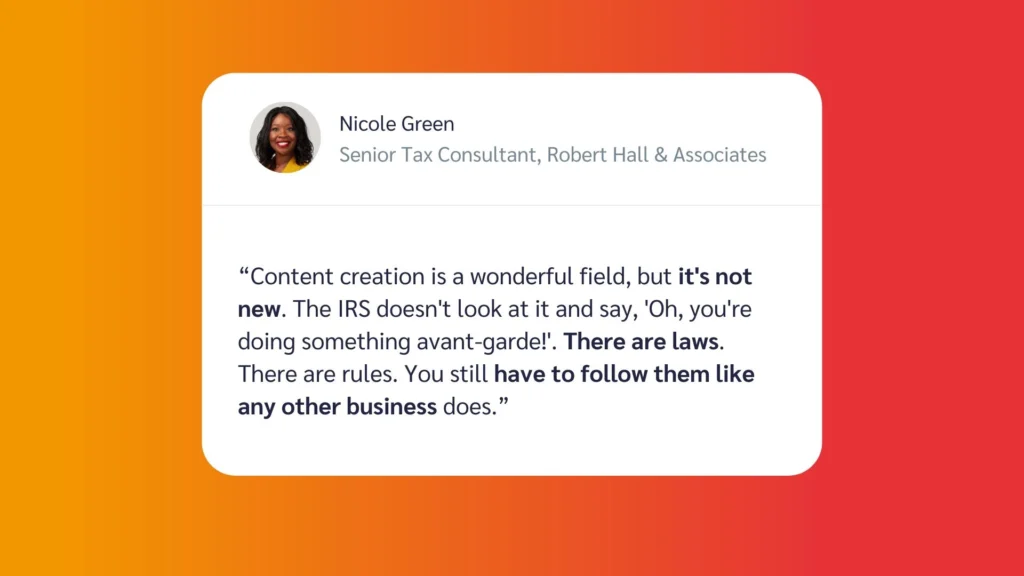
If a dreamy resort sends you on an all-expenses-paid trip in exchange for Instagram content, Uncle Sam also wants his share of that vacation.
Mixing your personal and business money can get messy (and risky!) when tax season rolls around.
“You should always treat content creation as a business, even if you’re still a full-time employee. Doing that from the start will help you choose the right business structure and avoid problems in the future,” says Kumi.

How much tax to pay
Figuring out how much you’ll owe at tax time depends on a few factors, including:
- Your business structure—are you an LLC, sole proprietor, or something else?
- Where you live
- The expenses you can write off
If you expect to pay $1,000 or more in yearly taxes, the IRS requires you to make estimated quarterly tax payments. Staying ahead of those contributions will help you avoid unexpected penalties or a surprise tax bill come April.
As a general rule, Green suggests that influencers set aside 30-35 percent of their earnings for taxes.
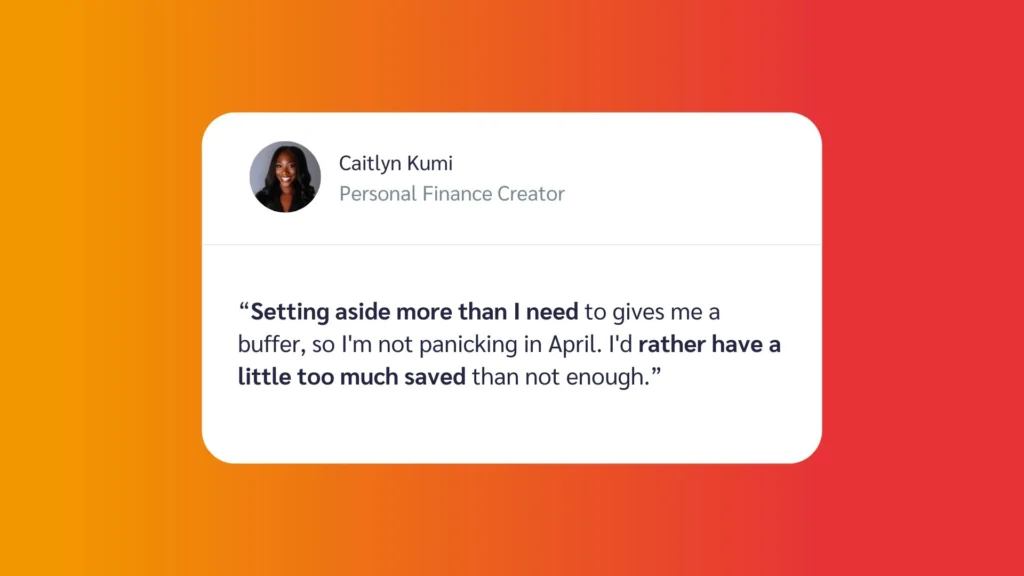
What happens if you skip out
If you overlook your taxes or don’t report all your income, you could face steep fines, late fees, or even a nerve-wracking audit. Plus, falling behind makes tax season extra stressful.
Green recommends accurately tracking your income so you know exactly how much you make.
“The worst thing is when people come to me and say, ‘I didn’t get all my 1099s, so I don’t know how much income I made,'” she says.
Set aside money regularly (remember 30–35 percent) so tax time is less intimidating––and you stay in good standing with Uncle Sam.
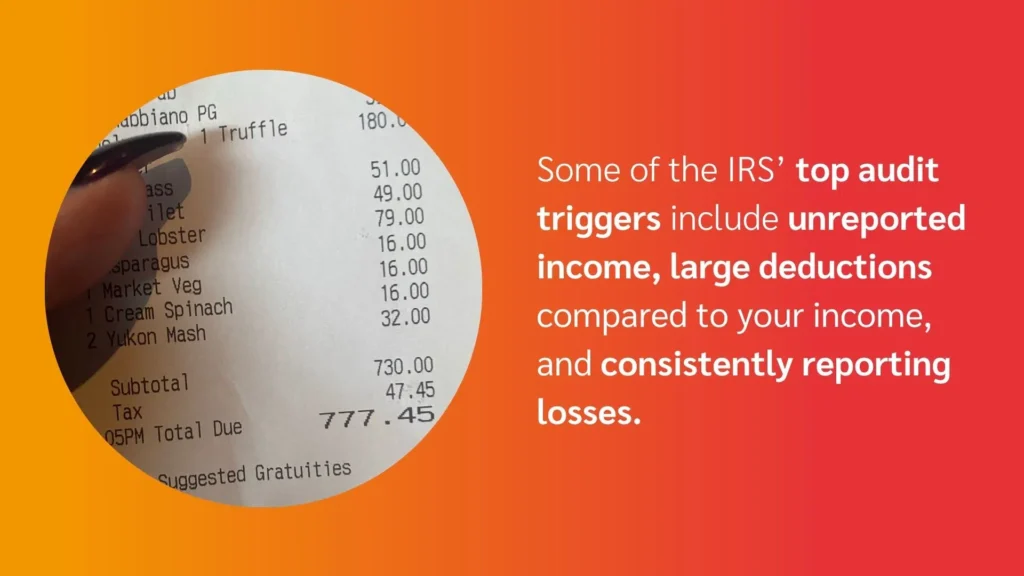
The easiest way for influencers to track income and expenses
If you mix brand payments with your Starbucks orders in one account, tax time will feel harder than it needs to be. The easiest solution is to open a separate bank account for your influencer earnings and business expenses.
As Green emphasizes, separate accounts are “the biggest key thing” for influencers. By separating your business and personal expenses, it’s much easier to figure out what’s taxable—and what’s just your daily latte habit.
Avoid labeling personal spending as a business expense. While it might be tempting, doing so raises red flags and could trigger an audit.
Even if influencing isn’t your full-time job (yet!), treating it as a proper business from the start simplifies your financial management and will make it easier to grow your brand.
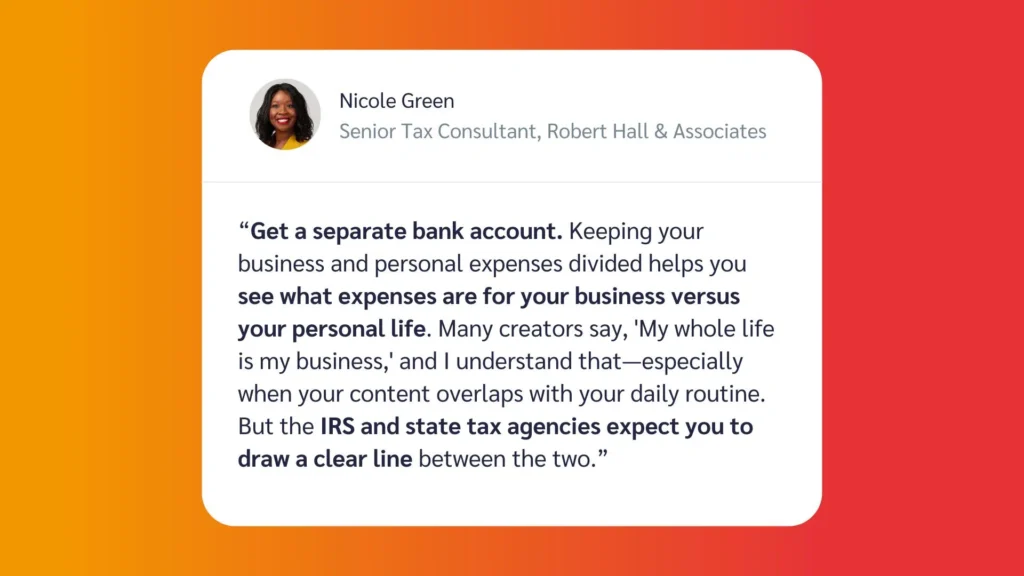
Types of records to maintain
Organizing your financial information might not be the most exciting task, but it will save you a lot of stress if tax questions ever arise.
The first step is to document all brand agreements—especially those involving gifted products, trips, or services. Keeping detailed records helps avoid confusion about what’s taxable.
Save all your tax-related documents for at least seven years. These documents usually include:
- Invoices
- Brand contracts
- 1099 forms
Digital copies make your life easier, so you stay on top of things without stacks of paper cluttering your workspace.
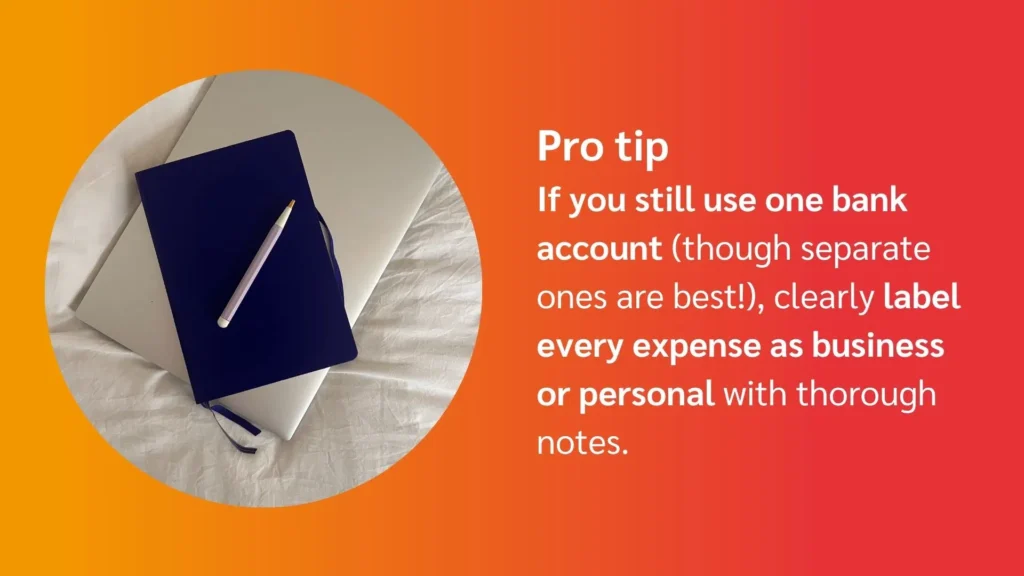
Tracking and reporting non-cash compensation
When you receive free products, trips, or services in exchange for content creation, these aren’t just perks—they’re taxable income according to the IRS.
As Green explains, “If I’m receiving something in return for something else, that’s income. And if that’s the intention, then you need to count it as income.”
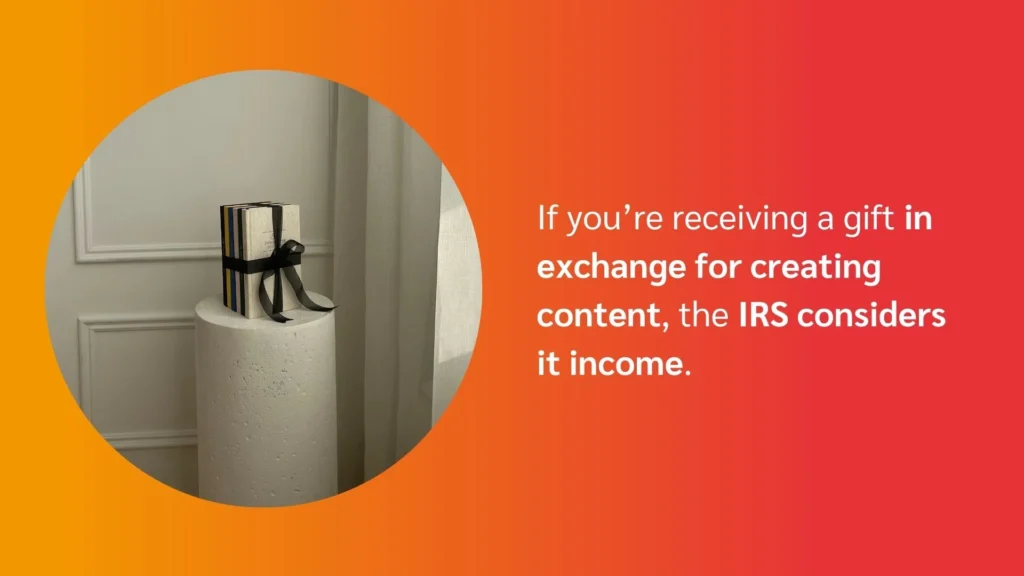
Valuing non-cash compensation
Rather than using retail prices to determine value, consider these approaches:
- Ask the brand directly: Companies are likely tracking these gifts as marketing expenses, so ask what value they’re using in their accounting.
- Use your standard content rates: “I usually just do a flat rate—it’s easier,” says Kumi. If you typically charge $500 for a sponsored post, you might assign that value to products received in exchange for similar content.
- Document fair market value: For higher-value items, note the actual value after considering factors like depreciation or wholesale pricing rather than MSRP.
Keep detailed records for each exchange, including:
- Description of what you received
- Content you created in return
- Date of the transaction
- How you determined the value
Pro tip: If you still use one bank account (though separate ones are best!), clearly label every expense as business or personal with thorough notes.
Financial tools that can help
Manually tracking expenses can quickly become overwhelming for busy creators. Fortunately, several tools can automate this process based on your business stage:
For beginners (under $50K annual revenue):
- Utilize the built-in analytics from business banking accounts to categorize expenses
- Take photos of receipts immediately and store them digitally by year
- Consider free or low-cost apps that integrate with your existing accounts
For established creators (over $50K annual revenue):
- Invest in dedicated bookkeeping software like QuickBooks or Quicken to automate categorization, track deductions, and prepare for tax filing
- Schedule monthly financial reviews to catch miscategorized expenses before tax season
Kumi recruits her accountant to assist with expense tracking. “Sometimes an expense shows up with a vague name, and they’ll ask, ‘What is this?'” explains Kumi. “Doing this monthly—or quarterly if I’m really swamped—makes a huge difference. There’s nothing worse than getting to tax season and trying to remember what an expense was from seven months ago.”
Green emphasizes simplicity: “Take pictures, throw copies of receipts into a Dropbox, label it for the year, and move on. Taxes are not the most complicated thing—you can make it really simple for yourself.”
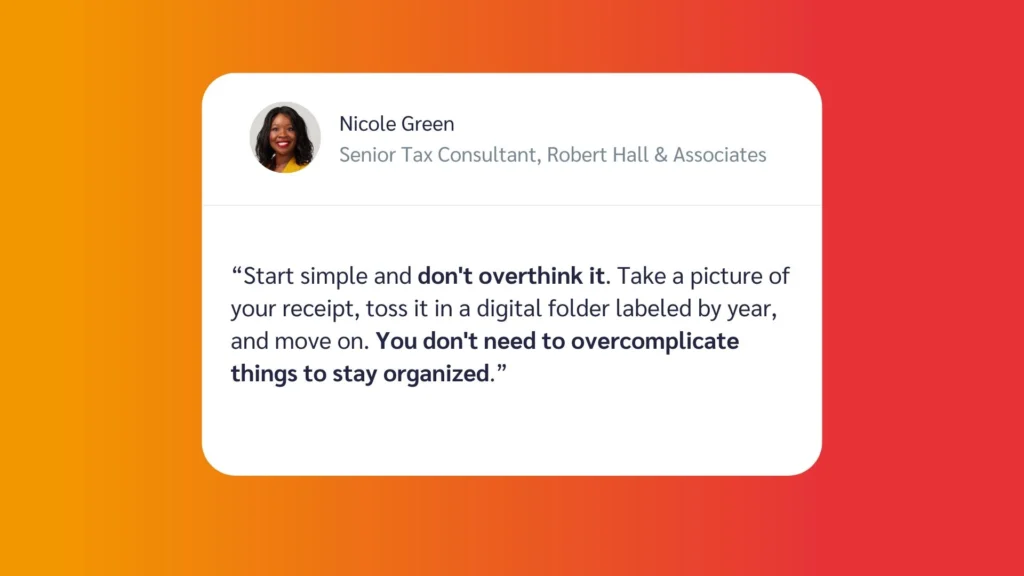
How to determine what qualifies as an influencer tax write-off
If you scroll TikTok, it’s easy to find videos claiming you can write off practically everything as a creator. But before you add that fancy new wardrobe or your daily green smoothie run to your tax deductions, you must understand the IRS’ write-off rules.
The IRS considers two main factors when considering tax write-offs––whether expenses are ordinary and necessary.
Ordinary means it’s common and accepted in the influencer world, such as:
- Editing software
- Camera gear
- Subscription tools
Necessary means it’s essential for running your influencer business, such as:
- Lighting equipment for video shoots
- Costs tied directly to content production
Stretching the definitions of ordinary and necessary too far can raise major red flags with the IRS.

Common influencer tax write-offs
Here are some popular and IRS-friendly deductions that most influencers can safely claim. However, it’s always important to talk to a tax professional and evaluate your specific circumstances before taking a write-off.
Equipment for producing content
You can claim equipment for creating content, including:
- Camera
- Microphones
- Lighting setups
- Tripods
Software subscriptions
You can claim tools that directly help you produce content or manage your influencer business, including:
- Adobe Creative Suite
- Canva Pro
- Subscription tools such as scheduling apps and analytics software
Internet and phone usage
Since running an influencer brand without your phone and Wi-Fi is impossible, you can usually claim a portion of these monthly bills as business expenses.
Like the home office deduction, you can only claim the part of your utilities used purely for business.
Office-related expenses
Whether you have a dedicated home office or rent a coworking space, you can claim costs related to your workspace, such as:
- Office supplies
- Desks
- A portion of your rent
Home office deductions require careful consideration. You can only deduct the square footage that’s used exclusively for business purposes, and claiming more than others in your field may raise eyebrows at the IRS.
“If you’re saying ‘I have my own business and I’m using part of my home,’ and your home is only 400 square feet, it doesn’t make sense to say that all of it is used for business. You can claim that maybe a fifth of it or something like that, but it needs to be proportional,” says Green.

Surprising deductions you might be missing
While you should be cautious and not overly creative (your new shoes probably don’t count), there are less obvious deductions you might be overlooking.
- Professional services and support. Fees paid to professionals who help you grow your business or produce content often qualify, such as photographers, videographers, makeup artists, accountants, or assistants.
- Travel-related expenses. You can usually claim flights, hotels, or transportation costs directly tied to attending industry events, influencer meetups, or business meetings.
- Pro-rated utility bills. If you’re working from a dedicated home office, a portion of your electricity, heat, or water bill might count—just don’t try writing off your entire monthly bill.
- Promotional expenses. If you purchased ads to promote your content, boosted posts, or bought branded merch to give away, these costs count as deductions.
Remember Kumi’s practical advice, “Know what you’re eligible for, but stay smart—getting audited isn’t worth a few extra deductions.”
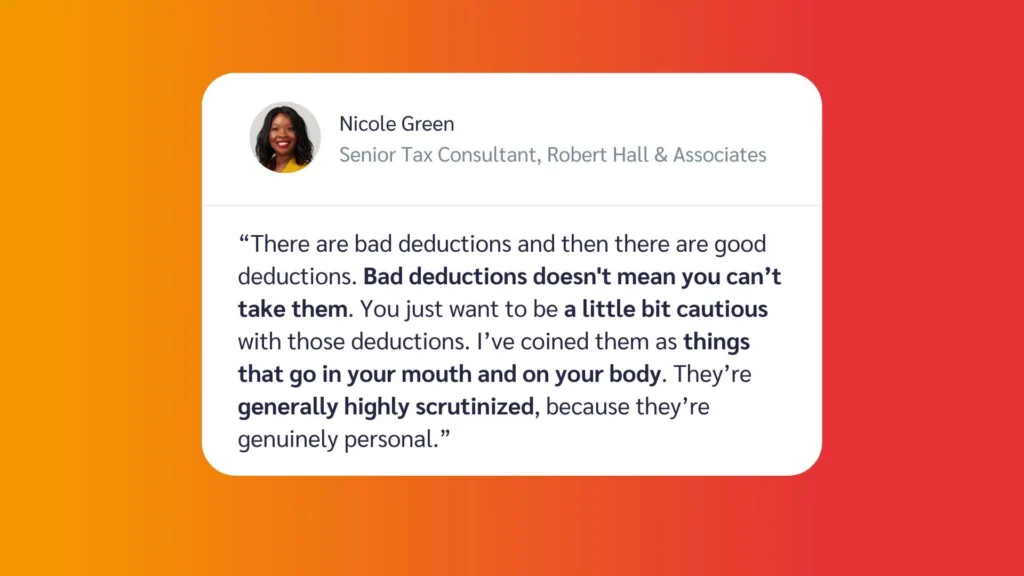
4 ways influencers can maximize their tax savings
Nobody wants to overpay their tax bill. But the good news is that as a creator, you’re well-positioned to take advantage of tax-saving opportunities.
Here are four smart ways to maximize your tax savings while growing your influencer brand.
1. Perform regular financial reviews throughout the year
Reviewing your finances only right before tax season? That’s a recipe for stress (and it’s not worth it).
“You should reconcile once a month. It’s important to understand how much you’re bringing in versus spending,” recommends Green.
Regularly updating your records makes it easier to:
- Categorize deductions
- Stay ahead of quarterly tax deadlines
- Reduce your chance of making costly mistakes
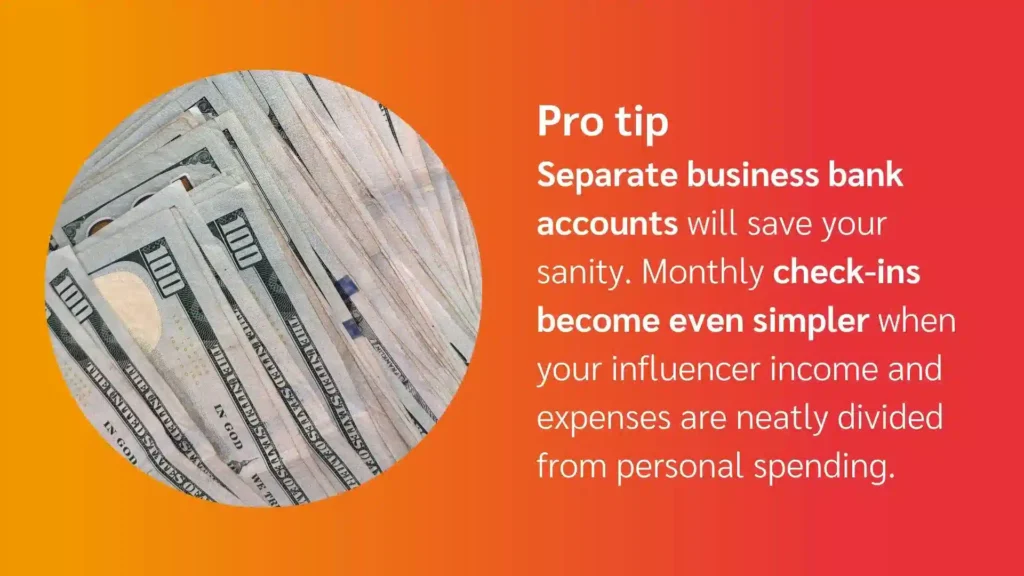
2. Focus on growing your profits
The IRS won’t keep letting you claim deductions if your creator gig never turns a profit—eventually, they’ll label it a hobby. You can level up your brand partnerships and sharpen your earning strategy in several different ways:
- Pitch higher-paying collaborations
- Secure higher-earning payment models, such as hybrid compensation
- Negotiate longer-term usage rights
- Sell digital products
- Consider using affiliate links
Building consistent profitability satisfies the IRS’s requirements for legitimate business status and safeguards your ability to claim valuable deductions that reduce your tax burden.
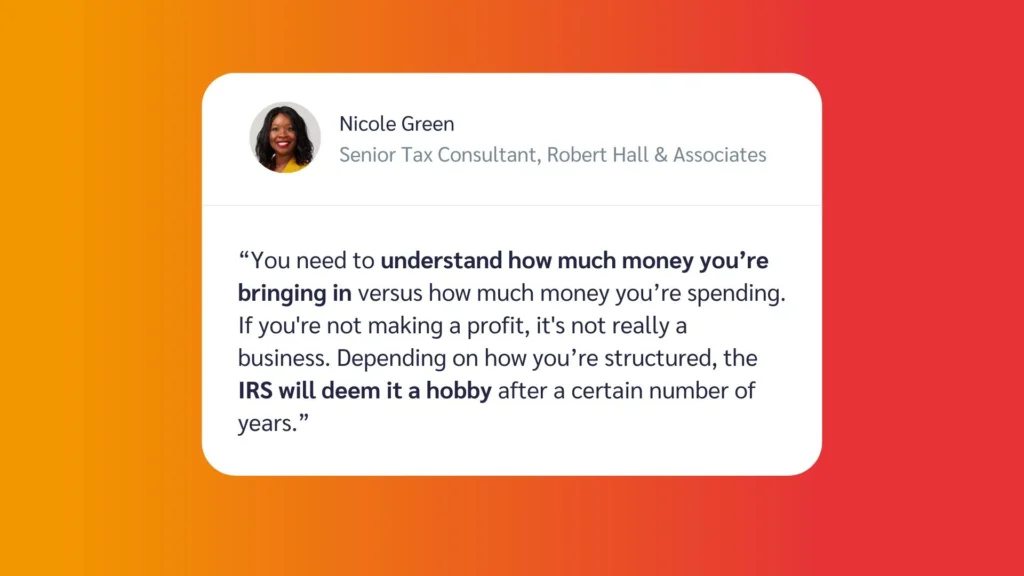
3. Consider the best legal structure for your business
Your business structure affects both your tax obligations and legal protection. As your influencer business grows, the optimal structure may change:
Common influencer business structures
| Structure | Best For | Tax Benefits | Limitations | Setup Complexity |
| Sole Proprietorship | Beginners with low income | Simple Schedule C filing, minimal paperwork | No personal liability protection, all income subject to self-employment tax | Low (minimal setup costs) |
| LLC | Growing creators needing liability protection | Same tax treatment as sole proprietorship, but with legal separation of business/personal assets | Higher fees than sole proprietorship, annual state filing requirements | Medium (state filing fees, operating agreement) |
| S-Corporation | Established creators earning $100K+ annually | Potential to reduce self-employment taxes through salary/distribution split | Requires payroll, higher administrative costs, more complex compliance | High (formation costs, payroll requirements) |
“Consider switching from an LLC to an S-corp when you’re making around $100,000 in revenue, or about $40,000 in profit after expenses,” advises Green. “Once you hit that profit range, the tax savings you’ll get from switching to an S-corp usually outweigh the costs of setting it up and maintaining it.”
As your business scales, your entity choice should evolve with it. Both experts recommend starting as a sole proprietor or LLC, then transitioning to an S-corp once your annual revenue approaches $100,000.
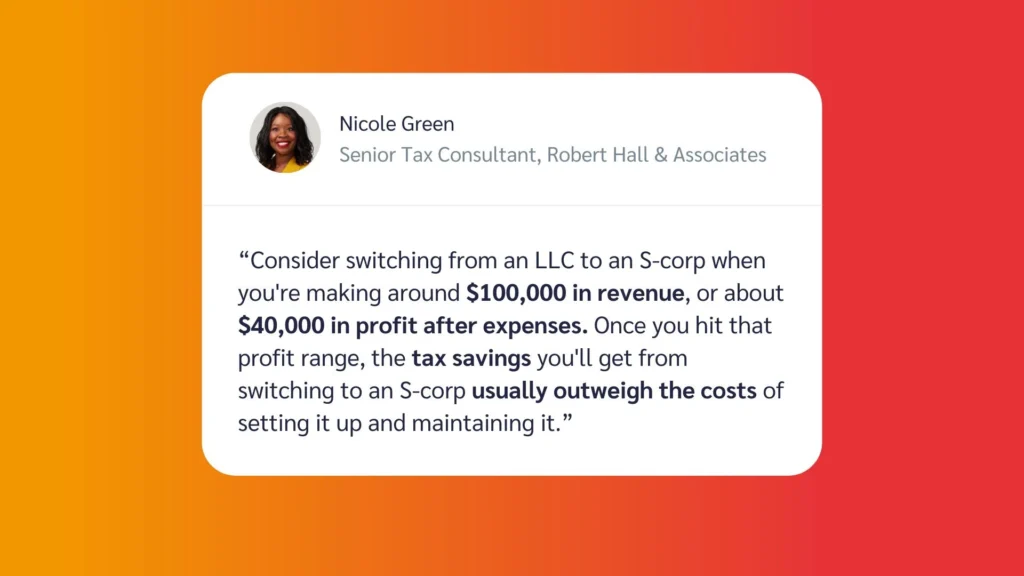
4. Consult with professionals for long-term success
Managing your taxes can work when you first start out, but hiring a professional becomes a wise investment as your influencer business grows.
If you partner with an accountant or tax advisor who understands the creator economy, it’s easier to take advantage of every deduction and stay compliant when rules change.
Kumi shares her own experience of growing her business and realizing that instead of pouring energy into her taxes, she wanted to focus on the creative side of her work. “As my business grew, I realized tax planning wasn’t where I wanted to DIY—I wanted professional help so I could focus elsewhere.”
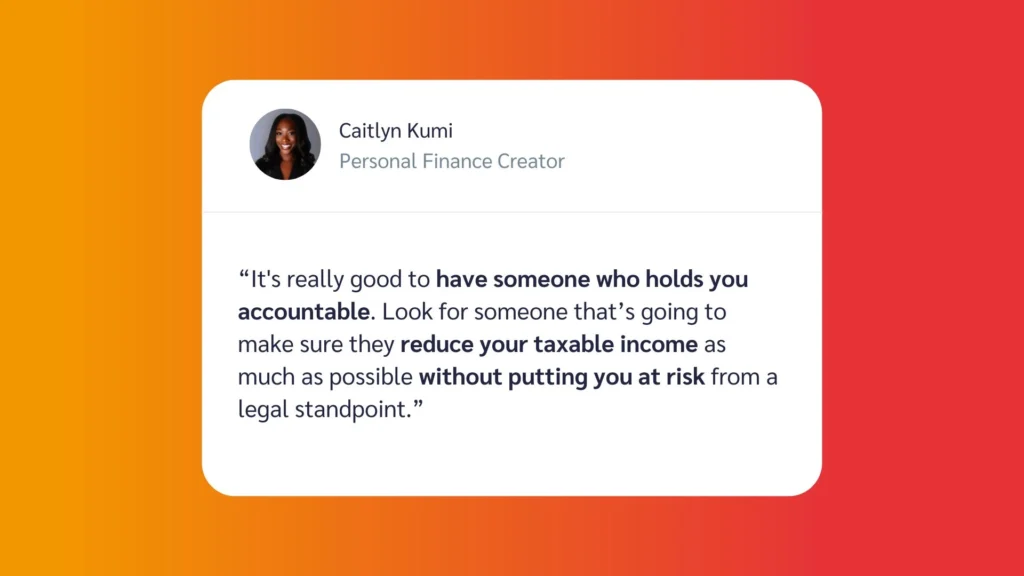
Set your business up for long-term success
Taking your finances seriously is key to staying on the IRS’s good side and building a profitable business. Whether you keep better records, choose the right business structure, or make smarter deductions, every decision affects protecting your income and helping it grow.
If you’re ready to level up your brand deals and bring in more high-quality partnerships, check out the impact.com Marketplace. It’s where top creators connect with leading brands. The platform is designed to help you grow your profits with long-term collaborations that make tax planning more exciting.
Related resources:
- Creator boot camp: Financial fit check (webinar)
- Creator analytics: How to prove your worth to land and keep more brand deals (blog)
- Hybrid payments: A path to higher-paying brand sponsorships for creators (blog)
- Creating an influencer media kit in 5 simple steps [+ free template] (blog)
FAQs
Yes, influencers pay taxes on income from brand deals, affiliate links, ads, and even gifted products if there’s an expectation to post. The IRS considers income taxable if you get paid (in cash or gifts) to create, promote, or post.
The exact amount of tax you owe depends on:
- Your income
- Where you live
- Your business structure
A good rule is to set aside 30–35 percent of your income for taxes. If your business is a sole proprietorship, you may need to make quarterly estimated tax payments if you expect to pay more than $1,000 a year in tax.
Taking deductions will also affect how much tax you owe as an influencer. It’s smart to keep good records and talk to a tax pro if you’re unsure.
Yes, influencers can write off business expenses considered ordinary (common in their industry) and necessary (helpful for running their businesses).
These expenses may include camera gear, editing software, website costs, part of your phone and internet bill, and even travel for brand deals. Always make sure you only write off things that are genuinely related to your content creation and not personal expenses.





